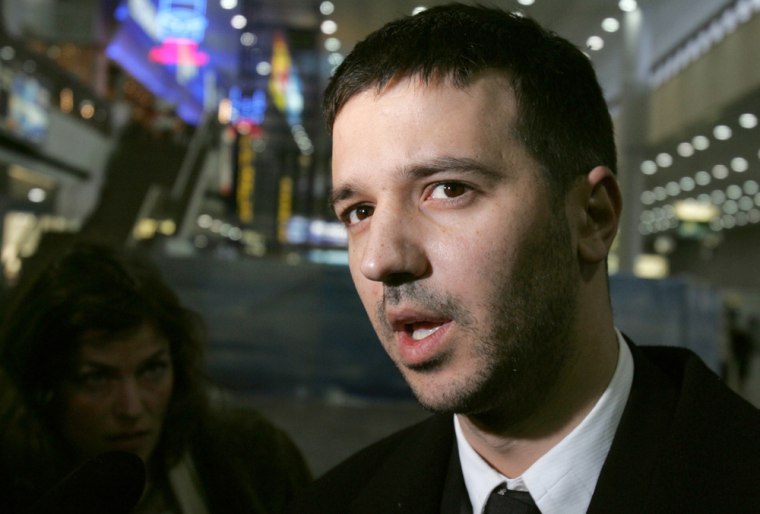Slobodan Milosevic had regular access to drugs and alcohol smuggled into his prison cell, yet the U.N. war crimes tribunal failed to take action despite warnings, tribunal officials said Tuesday.
Meanwhile, Milosevic’s family lawyer said his remains will be flown to the Serbian capital of Belgrade on Wednesday for burial. The announcement by Zdenko Tomanovic appeared to end a day of confusion over whether Milosevic’s funeral would be in Belgrade or in Moscow, where his widow and son live.
Two officials at Milosevic’s jail told The Associated Press the unit’s prison warden had cautioned the tribunal president and registrar that as a result of the drugs and alcohol, Milosevic’s health could not be guaranteed.
Nevertheless, they said, no action was taken to tighten supervision. The officials spoke on condition of anonymity because of the tribunal’s strict confidentiality rules.
The officials, who had access to confidential reports on Milosevic’s incarceration, were countering allegations by Milosevic’s loyalists that the former Serb president was poisoned or unwittingly given harmful drugs. They said two doctors had concluded that Milosevic intentionally took drugs that undermined the medicine prescribed for his heart ailments, in order to slow the pace of his war crimes trial.
Son calls death a murder
Hours earlier, Milosevic’s son alleged his father was murdered in custody. “He got killed. He didn’t die. He got killed. There’s a murder,” Marko Milosevic told AP Television News aboard a flight to the Netherlands to claim the body.
Prison warden Timothy McFadden refused interview requests, and U.N. tribunal spokeswoman Alexandra Milenov said the court could not comment “because the investigation into Milosevic’s death is ongoing.”
Milosevic, who presided over four Balkan wars and the breakup of Yugoslavia that cost some 250,000 lives, died of a heart attack in bed in his jail cell, according to preliminary autopsy findings. His body was found Saturday.
Milosevic’s body was transported to Amsterdam on Tuesday evening.
In Serbia, Ivica Dacic, deputy chief of Milosevic’s Socialists, had told The Associated Press earlier after talks with Milosevic’s widow, Mirjana Markovic, and son, Marko Milosevic, that “a Moscow funeral is a 99 percent certainty.”
A Belgrade court suspended an arrest warrant for Milosevic’s widow but also ordered her passport seized if she returns to Serbia. Markovic, considered the power behind the throne during Milosevic’s autocratic rule in the 1990s, faces charges of abuse of power.
Russian doctors challenge autopsy
Four Russian medical experts came to the Netherlands on Tuesday to examine the autopsy results, saying they distrusted the findings and the care Milosevic received.
Milosevic, who was defending himself against 66 counts of war crimes, was allowed to work in a private office where he could meet with witnesses and legal advisers unsupervised, making it impossible to monitor material they may have smuggled in to him, one of the officials told the AP.
A Dutch toxicologist, Donald Uges, said Monday that blood tests earlier this year uncovered traces of a drug used to treat leprosy or tuberculosis that would neutralize the effects of the beta-blockers Milosevic was taking for high blood pressure.
U.N. prosecutors complained as early as 2004 that Milosevic was defying his regime of prescribed medication and taking other drugs to manipulate his health to his advantage during the court proceedings. The trial was repeatedly interrupted at critical points because of his ill health.
In February 2004, Milosevic moved into a small office separate from his standard cell equipped with phones, computers and filing cabinets. It was there that he interviewed witnesses, consulted legal aides and prepared his defense. His main advisers were three Belgrade associates whom he met regularly. He also could interview witnesses at a second office at the U.N. court.
Confidential meetings in prison
Milosevic held confidential meetings with most of the 50 witnesses he called in his defense, as well as his wife and grandson, and former U.S. Attorney General Ramsey Clark.
The U.N. detention unit was a wing of a Dutch prison complex in the seaside resort of Scheveningen, a few miles from where the trial was held.
From the facility, Milosevic was able to review 1.3 million pages of testimony and documentation and more than 1,000 videos and DVDs that had been gathered for the prosecution case.
In an order, the trial judges insisted the office remain in “a privileged setting.” The room required two keys to gain access, one held by Milosevic and the other by prison officials.
The tribunal declared the case against Milosevic closed Tuesday.
Judge Patrick Robinson, who repeatedly clashed with the defendant over four years, said Milosevic’s “untimely passing ... terminates these proceedings.” A formal order closing the file would be issued shortly, he said.
The two-minute hearing brought an abrupt end to the most important war crimes trial in 60 years — a case that was meant to establish political responsibility for genocide.
Milosevic was the sixth war crimes suspect from the Balkans to die at The Hague. A week earlier, convicted former Croatian Serb leader Milan Babic, a witness against Milosevic, killed himself in the same prison.
